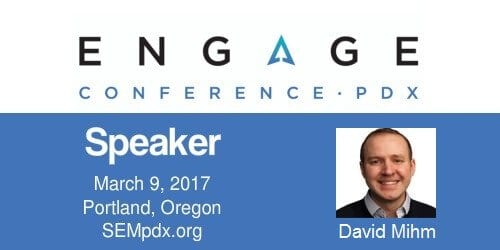David Mihm will be speaking on Local Search at the Engage Conference, which will take place March 9, 2017 in Portland. For more information, or to purchase tickets, please click here.

1) Please give us your background and let us know what you do for a living.
Most SEMpdx’ers have probably seen/heard too much of me already—so I’ll give you the short version.
I’ve been in digital marketing for 12 years, starting with website design, moving into SEO, then Local SEO, then co-founding GetListed/Moz Local, helping run that product at Moz for 3 years, and now I’ve moved on to a new one: Tidings. The “for a living” part is tough to answer at the moment, as I’m bootstrapping Tidings and just getting it off the ground, but hoping to be at breakeven soon enough!
2) In 2017, is it imperative that small businesses do some form of paid advertising? If yes, where is the best “bang for the buck”?
Well, imperative, no, but I do think that paid ads on Facebook and especially on Instagram are probably one of the best areas to spend digital dollars as a small business. The demographic and geographic targeting options are just amazing, and as long as you don’t listen to Facebook’s warnings about your audience size being too small, you should see a pretty great return on your ad spend.
In the long run, though, I’m always an advocate for owned/earned organic marketing as a better long-term investment for most businesses.
3) How should a small business reallocate resources in an ecosystem that’s devaluing the website?
I firmly believe it’s time to start thinking of your website as an API to be consumed by search engines and other hybrid voice/social/search platforms that may come along. Google in particular is trying to facilitate as many interactions and transactions directly in their SERPs and voice results as they can (a trend I’m sure our keynote speaker Cindy Krum will speak to), and their moves with AMP signal that even the presentation of content is something they want to own. Mark up your content with as many schemas as possible and keep your site architecture simple and flat.
That’s not to say your website shouldn’t still be a critical piece of your digital infrastructure, as the search engines and other platforms will still rely on it for relevancy, trust, and authority signals. Just that many, many, many more conversions will be happening off your website than on it.
In terms of where and when to allocate resources, that’s a much longer answer. This recent infographic illustrates my point-of-view better than I can here.
————–
Thanks for the interview opportunity, Todd! Looking forward to seeing everyone at Engage!
Todd Mintz knows PPC…knows Social Media…knows SEO…knows Blogging…knows Domaining…and knows them all real well. He runs growth marketing for )and is also a Director & Founding Member of SEMpdx: Portland, Oregon’s Search Engine Marketing Association, and he can be found here on Twitter and Facebook.
